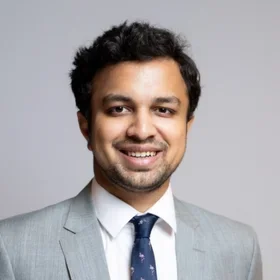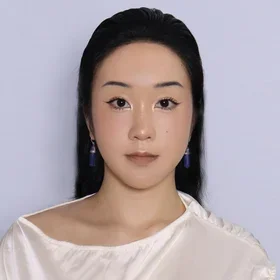By Shana Childs (’14JRN)
A decade ago, Bennie Johnson (’14SPS) was an ambitious chief marketing officer who was frequently traveling and trying to figure out the best ways to push his teams to improve. “I believe in being a leader who actually leads by action and example,” he says.
During one of his trips, he learned about the Executive M.S. in Strategic Communication at the Columbia University School of Professional Studies, a then-new part-time graduate program mostly comprising online courses in the evenings and on weekends. “I had seen information about the program years prior, but because I was living in my hometown, D.C., and the program was full-time in New York, the equation didn’t quite work,” he recalls. “All of a sudden, the executive format made it possible for me to enroll.”
In 2012, Johnson enrolled in the inaugural executive path, a sixteen-month master’s program specially designed for senior professionals. In addition to part-time online courses, the program convenes students, faculty, and guests on Columbia’s campus in New York City every other weekend and twice per semester for longer, four-day intensives to foster networking and collaboration.
At Columbia, Johnson expanded and deepened his network and honed his executive leadership skills—both of which continue to serve him, he says. After earning his Executive M.S. in 2014, Johnson became the chief strategy officer of the Council of Better Business Bureaus, where he managed partnerships with Google, the Federal Trade Commission, and Coca-Cola, among others. He later became CEO of the American Institute of Graphic Artists.
Johnson’s latest role is as the CEO of the American Marketing Association. It is the world’s largest community-based professional marketing network, with chapters in more than seventy cities. He also serves on the Columbia SPS Board of Overseers. “Staying connected to Columbia SPS greatly aligns with the work I do,” he says. “As a business leader, I’m often looking at the contemporary ways in which professions show up.”
In a recent interview, Johnson spoke about the impact of the relationships and skills he acquired at Columbia. Edited excerpts follow.
Why Columbia?
I’d always said that if I were to go back to school, I wanted it to be significant and meaningful. The people, the content, and the location of the executive program made a difference for me.
The executive program wasn’t for anybody who was a rookie; it was for people who were eager to learn not just the best practices but the emerging practices. At the time, I and many of my fellow student cohort members—many of whom are close friends and colleagues now—were all at a point of transition in our careers, but on the eve of doing bigger things.
In addition, the professors were people who were involved in all of the Columbia graduate programs as well as New York City–based professionals working full-time in a range of roles for global concerns. I felt that Columbia was going to bring together the best of the best, and that was the space I wanted to be in.
How did your Columbia education and network impact your career?
I took the lessons to heart—like taking advantage of your cohort as a network and building relationships. I’ve worked with so many of my classmates since my time at Columbia. I’ve been able to call upon partnerships and allies and resources as I’ve gone through my career.
I’ve also been able to call on some of my cohort members to serve on the Smithsonian Anacostia Community Museum board of trustees with me. For the last ten years, I’ve been able to bring several Columbia SPS grads to be a part of that network in professional and volunteer capacities.
Is there something that’s at the forefront now that was just emerging when you were at Columbia?
Disruption and emerging practices were predominant themes in the executive classes. The executive program centered on strategically focused, nimble, and agile organizational leadership. Yes, it included communication, PR, branding, and narrative, but it also included business analysis, case studies, crisis communication, and strategic pivots—it included all of the things that you need as an executive leader. It really is about contemporary leadership.
My colleagues and I were in the classroom constantly looking to fill our toolkits with resources and portfolios that equip us for a dynamic future. Our conversations were really robust then, and you see them now as an ever-present part of looking at how organizations are run.
What inspires you to give back to the Columbia SPS community?
Columbia SPS as an entire school has been an innovator by creating next-generation master’s degrees that blend a lot of disciplines to respond to rapidly evolving business needs. In working with the Strategic Communication, Nonprofit Management, Applied Analytics, and other master’s programs, I’ve come to appreciate how they all speak to what professionals need to thrive in the future.
What’s the best professional advice that you ever received?
I have three pieces of advice that I found meaningful for me in my life. The first: When I was an undergrad at Yale, a professor of art and design—who became a friend—pulled me aside and said, “When you get older, always collect art.” He explained that art can be a space for community, ideas, and innovation. It has been such a generative part of my life and my family’s; it opened me up to a whole world that I would not have been a part of.
The next piece of advice was from a mentor who was the head of PWC. He mentioned the importance of always taking five minutes to prepare before a meeting because chances are, that’ll add up to more than everyone else. That’s a really practical thing that I heard when I was 19, and it stays with me.
The last comes from my mother, who was an educator. She would always tell me and my brothers to never accept a “no” from someone who doesn’t have the power to give you a “yes.” I think about that when I’m navigating deals, and you can even think about it as an entrepreneur or innovator. Someone in your immediate path may not understand your vision, but somebody ahead of them may understand it.
About the Program
Columbia University’s Strategic Communication program is designed to respond to the urgent need for strategic perspectives, critical thinking, and exceptional communication skills across all types of organizations. The Executive Path is a sixteen-month graduate program designed to elevate the skills and knowledge base of experienced communication professionals and those in leadership positions across industries. The accelerated format of the part-time, hybrid coursework is ideal for executives who are working full-time and who may be based in or outside the New York City metropolitan area.
The priority application deadline for fall 2023 enrollment is February 15, and the final deadline is June 15. Learn more about the admission deadlines.


